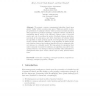Free Online Productivity Tools
i2Speak
i2Symbol
i2OCR
iTex2Img
iWeb2Print
iWeb2Shot
i2Type
iPdf2Split
iPdf2Merge
i2Bopomofo
i2Arabic
i2Style
i2Image
i2PDF
iLatex2Rtf
Sci2ools
125
click to vote
ATC
2009
Springer
2009
Springer
Management without (Detailed) Models
We present a resource management algorithm based upon guided “walks” within a system state space. Walks are guided via simple predictions of optimum behavior whose accuracy increases as system state approaches a predicted optimum. Optimum behavior is defined as maximizing payoff, which is the difference between value of provided service and cost of providing the service. Feedback between prediction, movement in the state space, and direct observation of behavior allows the algorithm to track optimum payoff, even though there is no detailed model of system behavior. Efficiency of the algorithm is defined as the ratio between observed and optimum payoffs, and can be estimated without reference to a detailed model. We demonstrate by simulation that, under commonly encountered conditions, our algorithm can achieve nearoptimal behavior. Our strategy is thus a potentially viable alternative to management based upon closed control loops in many practical situations.
Related Content
| Added | 26 May 2010 |
| Updated | 13 Jul 2010 |
| Type | Conference |
| Year | 2009 |
| Where | ATC |
| Authors | Alva L. Couch, Mark Burgess, Marc Chiarini |
Comments (0)






